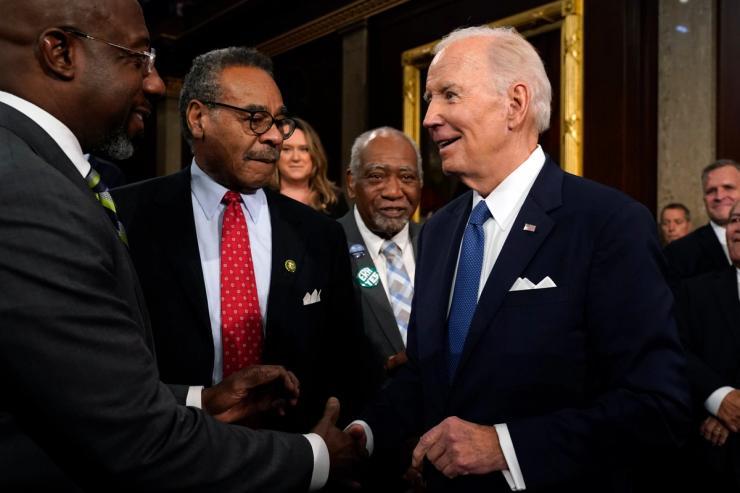The News
Many Democrats are trying to make the debate over President Biden a literal and metaphorical black and white issue. Missouri Congressman Emanuel Cleaver sits in the gray.
He’s a former chair of the Congressional Black Caucus, a so-far critical source of support for the president. He’s a party stalwart determined to find its best path towards victory, which may or may not be Biden. And he represents a majority-white Midwestern district at a time when there’s talk of an emerging racial split over the president’s nomination.
Cleaver hasn’t held back in his criticism of Biden’s debate performance. He winced recalling Trump denouncing immigrants taking “Black jobs” with little pushback. Had he been onstage, he would have demanded Trump define exactly what a “Black job” means.
“I think he just did not come back strong,” Cleaver said during an interview on Saturday. “And that’s what some of the younger men are saying, young men of color — they want him to be stronger.”
But he also isn’t sure what to do about Biden’s post-debate crisis yet — and time is of the essence.
“Here’s the danger that I think we have to be aware of,” he said. “We can’t continue to discuss this issue and philosophize about what’s going on.”
In this article:
Kadia’s view
I reached out to Cleaver because he’s been especially raw in discussing the party’s predicament since the debate. He’s been working things out in real time, balancing conflicting concerns, and refusing to make the process look easy or suggest there’s one obvious solution.
As he mentioned, though, this kind of debate can’t go on forever. The timeline Cleaver has in mind is the convention — not the Democratic one in August, the Republican one starting on Monday.
“We undermine our own candidate, whoever he or she is, if we don’t stand ready as soon as the gavel hits on the closing of the Republican convention to just go out after them,” he said. “I can see us still trying to get things organized over the next six days during the time that the Republicans are in Milwaukee. However, if we are not organized and ready to go with Joe Biden or someone by the end of that Republican convention, I think we’re in trouble.”
Resolving that split by then will be difficult, however. He had just spoken with union leaders Friday, who he said were “inflexibly committed” to Biden’s candidacy. The president had courted them hard, they’d won major concessions in office, and “they did not see enough of the things that are alarming people and the party to make a change.”
Even among Biden’s union base, though, some divisions have emerged. The AFL-CIO has been one of the biggest players to reaffirm Biden’s candidacy, although UAW head Shawn Fain —who sits on its executive council — has questioned his ability to win.
Closer to home, Cleaver sees an age split over Biden’s candidacy within his own family. His father passed away last year, but it was impossible to imagine him ever turning on Biden — he was a longtime fan who would often talk about his civil rights record, in particular. But that’s not how the younger members of his family think about him.
“I have young people in my family — my children, nieces and nephews — who are not as enthusiastic about Joe Biden at this point,” he said. “But I think, in the final analysis, they are going to vote for Joe Biden, because the other guy is not a viable option.”
Then there’s the Congressional Black Caucus, which is seen as perhaps the most important player in this process. After the current CBC chairman Steven Horsford backed Biden on Monday and set up a virtual caucus meeting with the president, some Democrats thought the threat to his nomination was all but over.
Things proved more complicated than that. Behind the scenes, The Washington Post reported that the group failed to find enough support for a joint statement backing up Biden that might have been a political haymaker.
Cleaver didn’t directly address that statement, but suggested the caucus might still be looking for reassurances from the White House about their priorities, like child tax credits and voting rights legislation, as they have in other situations where their support was important.
But he did note that the image of Black Democrats in ultra-safe, majority-minority districts was outdated. Just like other caucuses, they had members in competitive races, or running for statewide office, who were still trying to gauge what effect Biden would have on their election. A Republican wave could dramatically thin the CBC’s own ranks.
“We have to try to protect all of our members, and we have a lot of members,” he said. “People assume that my district that I serve is a Black district — it is not. I have about 20% African American.”
At the same time, Cleaver pointed out — as many others have — that not a single member who has called for Biden to drop out has come from their caucus.
“I think what we have to do — what we are doing,” he said. “The 60 members of the Black Caucus are trying to use our leverage, because we’re the largest caucus in Congress, to put our foot down on one side or another and influence where the entire party goes.”
So what would it take for them to weigh in? One major factor could be Minority Leader Hakeem Jeffries, who has personally supported Biden, but has stayed in “listening mode” while hearing from a more skeptical caucus. He has not tipped his hand as to how that process might end. Biden is now addressing various factions individually in virtual meetings — two were scheduled for Saturday.
“I think our respect for Hakeem Jeffries is so high that you’re going to find that we’re going to act in deference to him right now,” Cleaver said. “We’re not going to get out in front of him. So when he finally says something about how we should go, I think you can expect that right after that, just about all 60 of us falling right in line.”
The Senate is going through a similar process. Senate Majority Leader Chuck Schumer has said “I’m with Joe” when asked about Biden, but is listening to members and — according to a report in Axios — privately considering alternative nominees in conversations with donors.
When I asked Cleaver to comment on the report that Schumer might not be fully committed to Biden, he responded, “I’ll tell you after I get off the ground from my heart attack.”
Notable
- The Congressional Hispanic Caucus has been going through its own debate over Biden’s candidacy. While its leadership is solidly pro-Biden, three members have called for Biden to step down and NOTUS reported that these tensions came to the fore during a virtual meeting with Biden on Friday.


